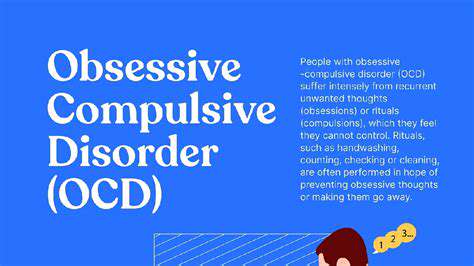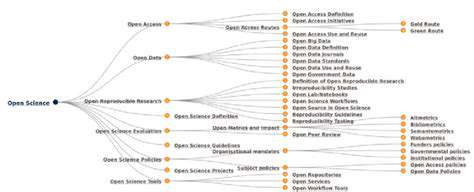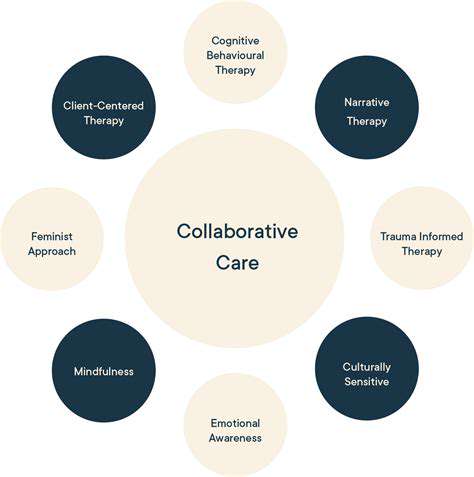Understanding Obsessive Compulsive Disorder (OCD)

Understanding the Nature of Obsessive Thoughts
Obsessive thoughts are recurring, intrusive, and unwanted thoughts or images that can significantly disrupt a person's daily life. These thoughts are often perceived as disturbing or inappropriate, and they can be extremely difficult to dismiss or control. Recognizing these thoughts as a symptom, rather than a character flaw, is crucial for effective management. Understanding that these thoughts are a part of a larger pattern, rather than isolated incidents, is essential for seeking appropriate support.
Identifying Common Obsessive Themes
Obsessive thoughts can manifest in various forms. Some common themes include concerns about contamination, doubts about actions, fears of harm to oneself or others, and repetitive and intrusive religious or moral ideas. It's important to remember that these themes are not universally experienced and that individual experiences vary significantly. Seeking professional guidance can help in understanding the specific triggers and patterns associated with your own obsessions.
Distinguishing Obsessions from Normal Worrying
While everyone experiences worry from time to time, obsessive thoughts differ significantly from normal worries. Normal worries are often situational and temporary, while obsessive thoughts are persistent, intrusive, and difficult to control. Obsessions can consume significant mental energy and interfere with daily functioning, while normal worries typically resolve with time and perspective. Identifying the difference is key to determining if professional intervention is necessary.
The Impact of Obsessive Thoughts on Daily Life
Obsessive thoughts can have a profound impact on daily life, affecting relationships, work performance, and overall well-being. Individuals experiencing these thoughts may avoid certain situations, spend excessive time trying to neutralize their thoughts, or experience significant anxiety and distress. These behaviors can lead to isolation and a decreased quality of life. Recognizing the impact is a crucial step towards seeking help and developing coping mechanisms.
The Role of Anxiety and Stress
Anxiety and stress play a significant role in the development and perpetuation of obsessive thoughts. High levels of stress can trigger or exacerbate existing obsessions, making them more intense and difficult to manage. Stressful life events, such as job loss, relationship problems, or financial difficulties, can act as triggers for obsessive thoughts. Addressing underlying stress and anxiety is often a key component of managing obsessive thoughts effectively.
Seeking Professional Help for Obsessive Thoughts
Experiencing obsessive thoughts doesn't mean you're alone or failing. Seeking professional help from a therapist or counselor is essential for effective management. A mental health professional can provide a safe and supportive environment to explore the root causes of your obsessions and develop personalized coping strategies. They can also help you understand the underlying factors contributing to your experience, and develop effective strategies for managing your obsessive thoughts.
Developing Coping Mechanisms for Obsessive Thoughts
Developing coping mechanisms is a crucial aspect of managing obsessive thoughts. These mechanisms can include relaxation techniques, mindfulness practices, and cognitive behavioral therapy (CBT) strategies. These methods help individuals challenge their obsessive thoughts and develop healthier ways of responding. Implementing these strategies consistently can significantly reduce the impact of obsessive thoughts on your daily life and improve your overall well-being.

The Underlying Causes and Contributing Factors of OCD
Genetic Predisposition
Research consistently points towards a genetic component in the development of Obsessive-Compulsive Disorder (OCD). Individuals with a family history of OCD are significantly more likely to develop the condition themselves. This suggests that certain genes may increase vulnerability to the disorder, potentially influencing brain structure and function in ways that make individuals more susceptible to developing obsessive thoughts and compulsive behaviors. Understanding these genetic predispositions is crucial for developing targeted interventions and preventative strategies.
While specific genes haven't been definitively identified as the cause of OCD, ongoing studies are investigating potential links between various genetic markers and the disorder's manifestation. This ongoing research promises to shed more light on the complex interplay between genetics and environmental factors in OCD development.
Neurobiological Factors
Neurobiological factors play a significant role in the development and maintenance of OCD. Studies have shown abnormalities in brain regions associated with thought processes, emotions, and behaviors, including the orbitofrontal cortex, caudate nucleus, and anterior cingulate cortex. These areas are involved in regulating impulses and controlling behaviors, and dysfunction within these regions can contribute to the manifestation of obsessive thoughts and compulsive behaviors.
Environmental Triggers
While genetics contribute to a predisposition, environmental triggers can also play a pivotal role in the onset and progression of OCD. Significant life stressors, such as trauma, major life changes, or stressful relationships, can act as catalysts for the development or exacerbation of OCD symptoms. Understanding these environmental factors is crucial for developing comprehensive treatment strategies that address both the internal and external influences on the disorder.
Psychosocial Factors
Beyond genetics and neurobiology, psychosocial factors also contribute to the development and maintenance of OCD. Learned behaviors, coping mechanisms, and personality traits can influence how individuals respond to stress and manage their thoughts and emotions. For example, certain personality traits, such as perfectionism or a tendency towards anxiety, might increase a person's vulnerability to developing OCD.
Cognitive Processes
Cognitive processes are central to understanding OCD. Individuals with OCD often experience distorted or irrational thoughts and beliefs (obsessions) that lead to compulsive behaviors. These cognitive distortions can involve worries about contamination, harm, or orderliness, and these thoughts can become intrusive and difficult to control. Identifying and challenging these cognitive distortions is a key component of effective treatment.
Learned Behaviors and Habits
OCD symptoms can also develop or worsen due to learned behaviors and habits. For example, if a person repeatedly engages in a specific compulsive behavior to relieve anxiety associated with an obsessive thought, they may reinforce that behavior over time, making it harder to break the cycle. Understanding how these learned patterns contribute to the disorder is crucial for developing effective behavioral therapies that help break these maladaptive associations.
Read more about Understanding Obsessive Compulsive Disorder (OCD)
Hot Recommendations
- AI Driven Personalized Sleep Training for Chronic Insomnia
- AI Driven Personalization for Sustainable Stress Management
- Your Personalized Guide to Overcoming Limiting Beliefs
- Understanding Gender Dysphoria and Mental Health Support
- The Power of Advocacy: Mental Health Initiatives Reshaping Society
- Building a Personalized Self Compassion Practice for Self Worth
- The Ethics of AI in Mental Wellness: What You Need to Know
- AI Driven Insights into Your Unique Stress Triggers for Personalized Management
- Beyond Awareness: Actionable Mental Health Initiatives for Lasting Impact
- Creating a Personalized Sleep Hygiene Plan for Shift Workers











